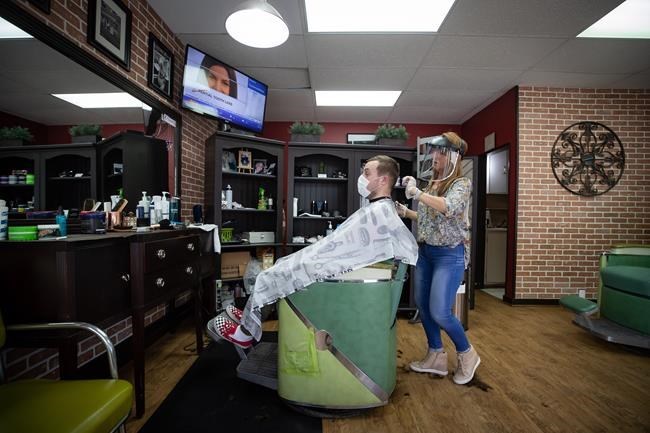VICTORIA — British Columbia's economic restart got off to a slow and steady pace, with business owners and operators saying they would rather take their time to protect customers and employees from COVID-19 than open their doors too early.
B.C. government operating restrictions placed on restaurants, pubs and some personal and health services, including hair stylists and dentists, were lifted Tuesday due to the province's successful effort slowing the spread on the novel coronavirus.
But some business operators and owners were planning to reopen later this month or in June.
"We'd rather be a couple days later with this than do the wrong thing a couple days early," said Greg McAuley, an operator of 10 Tim Hortons franchises in Metro Vancouver.
McAuley said preparations were still underway to ensure his outlets can safely accommodate and protect customers and staff when they begin seating customers. Tim Hortons and many other B.C. restaurants have been operating with take-out and delivery services since health restrictions closed their seated areas two months ago.
McAuley said he expected two of his outlets in Surrey and Langley to reopen fully Wednesday and the others are expected to be running by the end of the week.
Every employee and service representative who enters a Tim Hortons will have their temperature checked for the presence of fever and they must wear masks, he said. All employees will wear masks and gloves during their shifts and the cashier areas inside the restaurant and the drive through will have protective Plexiglas shields, McAuley said.
The seating areas, cashier zones and other high-touch locations in the restaurant will undergo frequent cleaning, he said.
"The response we've had from our guests has been terrific," said McAuley about the protective measures.
Penticton barber Thomas Hart said he's not reopening his business until at least June 2 to allow him to secure scarce personal protective equipment for customers and staff.
Hart said the pandemic has resulted in a shortage of the blue disinfectant product Barbicide that barbers use to clean their tools and work areas. He said he currently has a two-week supply of the product.
"Right now, we're in a stand still if we can even open by the second of June, which is what we've communicated to our customers," said Hart, who represents a newly formed coalition of about 300 barbers.
WorkSafeBC, the province's workplace safety agency, released guidelines last week ahead of Tuesday's reopening.
The guidelines cover sectors ranging from restaurants to offices and include guidance on how many people should be allowed in a business as well as controlling entry and exit points. The safety agency said before reopening businesses must have a COVID-19 safety plan to protect workers and it must be displayed.
Provincial health officer Dr. Bonnie Henry said Tuesday she's confident B.C. can continue to flatten the COVID-19 curve, but the province must act slowly.
"For employees, customers and business owners, I want to reassure you that we would not be easing these restrictions if we did not feel we could do so safely," she said.
Henry reported two new COVID-19 cases in B.C. and three deaths.
David Green, a University of B.C. economics professor, said the timing of the economic restart makes sense.
Green said he was part of a team at the University's Vancouver School of Economics that created a tool to assess the risks and benefits of reopening different sectors of B.C.'s economy amid the pandemic.
The tool can analyze the benefits of reopening the economy relative to the virus transmission risk in more than 300 occupations in over 100 industries, he said.
"The point of what we've been working on is to try to help the health authorities and the government think about how to manage the opening up," Green said.
He said the tool places barbers and hair stylists as high-risk occupations with regards to COVID-19. Restaurant managers are also at high-risk because managers interact regularly with employees, customers and other service providers.
Among the riskiest occupations are dentists, dental hygienists, physiotherapists, doctors, and nurses, said Green.
McAuley said customers have been using take-out services at Tim Hortons since March, but many have said they are anticipating the reopening.
"We've taken the advice of the health authorities as best we can and implemented all those procedures and, I think, we're coming through the other side now."
This report by The Canadian Press was first published May 19, 2020.
Dirk Meissner, The Canadian Press



